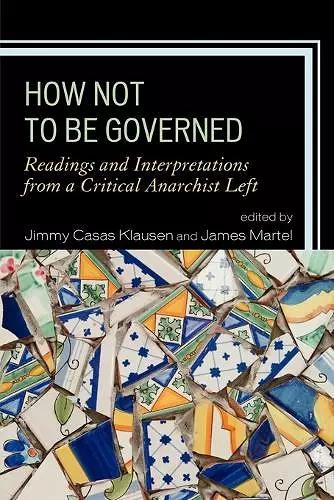How Not to Be Governed
Readings and Interpretations from a Critical Anarchist Left
Jimmy Casas Klausen editor James Martel editor
Format:Paperback
Publisher:Lexington Books
Published:13th Jan '11
Currently unavailable, and unfortunately no date known when it will be back

How Not to Be Governed explores the contemporary debates and questions concerning anarchism in our own time. The authors address the political failures of earlier practices of anarchism, and the claim that anarchism is impracticable, by examining the anarchisms that have been theorized and practiced in the midst of these supposed failures. The authors revive the possibility of anarchism even as they examine it with a critical lens. Rather than breaking with prior anarchist practices, this volume reveals the central values and tactics of anarchism that remain with us, practiced even in the most unlikely and 'impossible' contexts.
This is a unique and exciting collection of inquiries into anarchism and political theory, anarchism as political theory. Martel and Klausen's introduction usefully situates anarchism in relation to contemporary political struggles. The authors make use of a wide variety of political theorists, including Foucault, Arendt, Benjamin, and Nietzsche, to discern and develop anarchist themes. -- Kathy Ferguson, Department of Political Science, University of Hawai'i
Rather than simply rehashing classical anarchism, this work offers a genuinely original and innovative re-engagement with the properly heterogeneous and heretical dimension of anarchist thought, emphasising its untimely timeliness. With the category of 'critical anarchism,' anarchism is taken beyond the epistemological boundaries of the old masters like Bakunin and Kropotkin, revitalized through a dialogue with alternative perspectives such as post-structuralism, and reconsidered in the context of today's struggles against neo-colonialism and global capitalism. Critical anarchism thus brings to light the diversity and liveliness of anarchism, showing that it is more productively thought as a horizon of becoming. Above all, in pointing to the potential of anarchism as an alternative to the failures of statism on the one hand, and capitalism on the other, the book reminds us of the original libertarian-egalitarian impulse at the heart of radical politics and thus makes a vital contribution to what I see as the fundamental political challenge of today: reclaiming the ethical project of how not to be governed from the grasp of the radical Right. -- Saul Newman, Professor of Political Theory, Goldsmiths, University of London
Fresh, brave, and excellent to think with. Nothing beats this as an original, critical and sympathetic reassessment of anarchism as a body of evolving emancipatory practices and as a body of knowledge. I can't wait to teach it. -- James C. Scott, Sterling Professor of Political Science and Anthropology, Yale University
It is clear that only the abolition of the state structure can solve a number of oppressions, not least in relation to undocumented migrants. This book invites us to think of emigration not only in the perspective that the world is our homeland, but also because this population movement is a character of dissent from the left of both countries in respect of the so-called home, as Banu Bargu suggests. In short this book does not fail to stir the debate it deserves. * Refractions *
ISBN: 9780739150351
Dimensions: 232mm x 155mm x 13mm
Weight: 347g
244 pages